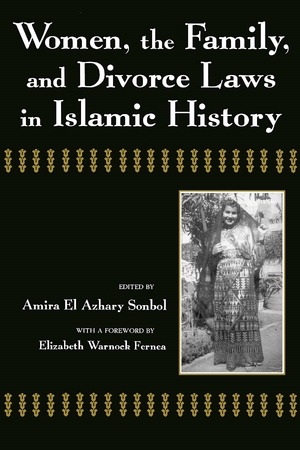"This outstanding collection of essays not only creates a new picture of the lives of women and families in the Ottoman Empire but also clearly establishes the rich potential of Islamic legal records for the field of social history."—American Historical Review
Description
The eighteen essays in this volume cover a wide range of material and reevaluate women’s studies and Middle Eastern studies, Muslim women and the Shari’a courts, the Ottoman household, Dhimmi communities, children and family law, morality, and violence.
Table of Contents
PART ONE: Reevaluating Women's Studies
1. Women and Citizenship in the Qur'an, Barbara Freyer Stowasser
2. Women and Modernization: A Reevaluation, Afaf Lutfi al-Sayyid Marsot
3. La Femme Arabe: Women and Sexuality in France's North African Empire, Julia Clancy-Smith
4. Organization of Culture and the Construction of the Family in the Modern Middle East, Peter Gran
PART Two: Muslim Women and the Shari'a Courts
5. Women, Law, and Imperial Justice in Ottoman Istanbul in the Late Seventeenth Century, Fariba Zarinebaf-Shahr
6. The Family and Gender Laws in Egypt During the Ottoman Period, Abdal-Rehim Abdal-Rahman Abdal-Rehim
7. The Divorce Between Zubaida Hatun and Esseid Osman Aga: Women in the Eighteenth-Century, Shari'a Court of Rumelia Svetlanalvanova
8. Muslim Women in Court According to the Sijill of Late Ottoman Jaffa and Haifa: Some Methodological Notes, Iris Agmon
PART THREE: The Ottoman Household
9. Marriage among Merchant Families in Seventeenth-Century Cairo, Nelly Hanna
10. The Ties That Bound: Women and Households in Eighteenth-Century Egypt, Mary Ann Fay
11. Drawing Boundaries and Defining Spaces: Women and Space in Ottoman Iraq, Dina Rizk Khouri
PART FOUR: Dhimmi Communities and Family Law
12. Textual Differentiation in the Damascus Sijill: Religious Discrimination or Politics of Gender? Najwa al-Qattan
13. Reflections on the Personal Laws of Egyptian Copts, Mohamad Afifi
PART FIVE: Children and Family Law
14. The Rights of Children and the Responsibilities of Women: Women as Wasis in Ottoman Aleppo, 1770-1840, Margaret L. Meriwether
15. Adults and Minors in Ottoman Shari'a Courts and Modern Law, Amira El Azhary Sonbol
PART SIX: Women, Morality, and Violence
16. Confined, Battered, and Repudiated Women in Tunis since the Eighteenth Century, Dalenda Largueche
17. Law and Gender Violence in Ottoman and Modern Egypt, Amira El Azhary Sonbol
18. Women and Society in the Tulip Era, 1718-1730, Madeline C. Zilfi
Glossary of Arabic Terms
Glossary of Turkish Terms
Works Cited
Index
Tables
5.1. Petitions Presented by Women in Istanbul in 1675
5.2. Those Whom Women Petitioned Against in 1675
16.1. Divorce, by Profession of Husband
About the Author
Amira El Azhary Sonbol is assistant professor of society, history and law at Georgetown University, and the author of The Creation of a Medical Profession in Egypt, 1800-1922, also published by Syracuse University Press.


